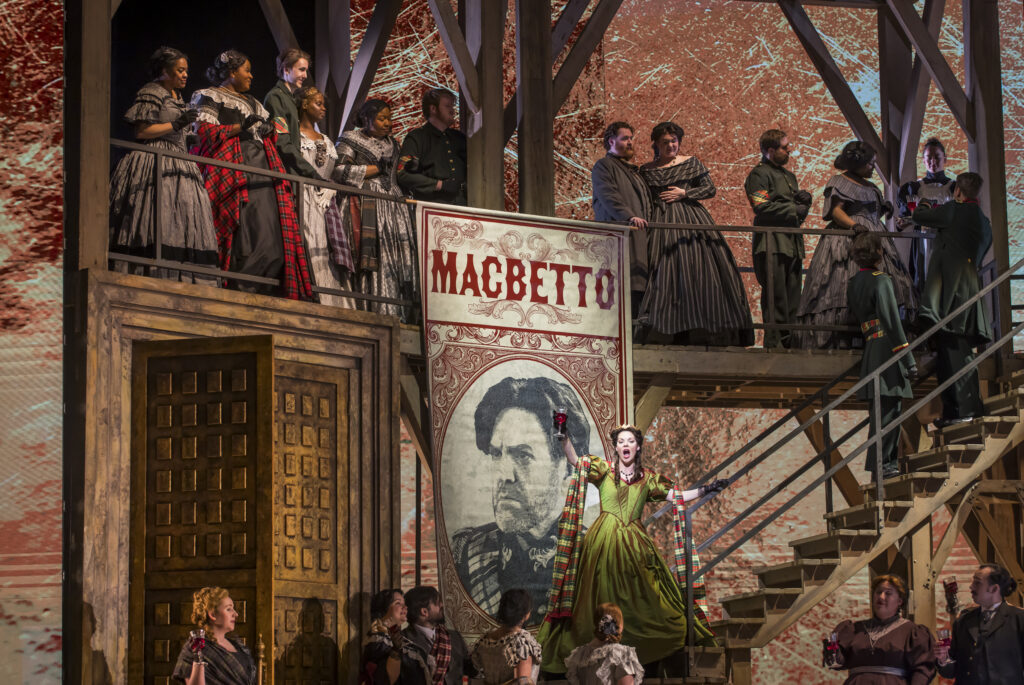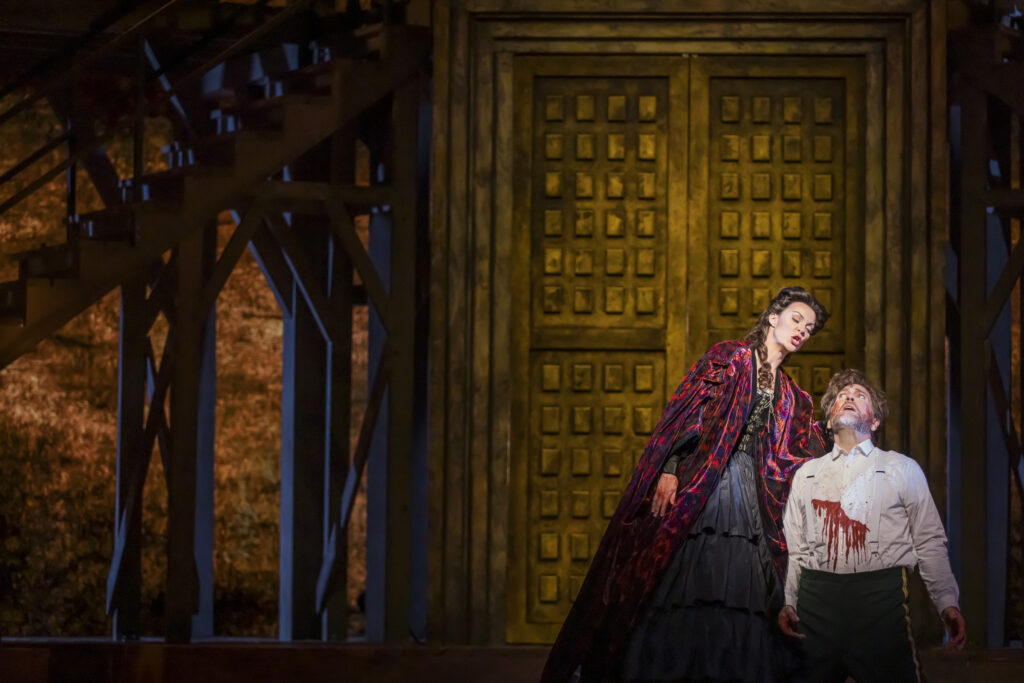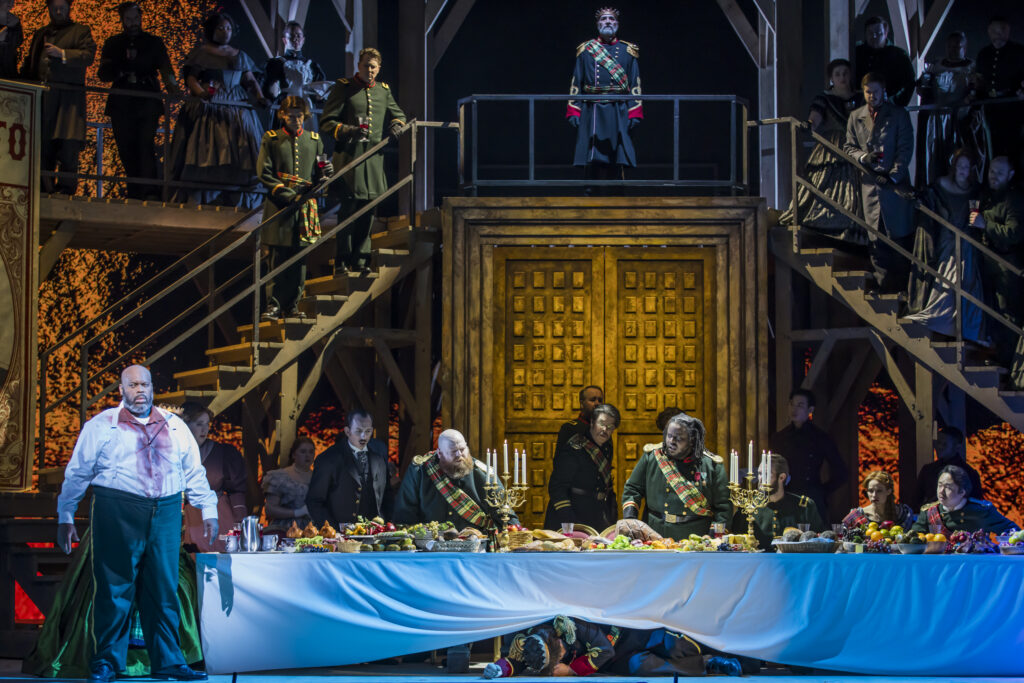Dark. Menacing. Sinister. Verdi’s Macbeth opened last Saturday at the Cobb Energy Performing Arts Centre to much fanfare. Though the company cannot claim to be a haven for the early Verdi canon, the Atlanta Opera has mounted the composer’s first Shakespearean foray twice before. The first time in 1993 during the company’s short stay at the Woodruff Arts Center, featuring the inspired pairing of RoseMarie Freni and the celebrated Timothy Noble. The opera returned to Atlanta in 1999, this time at the Fox Theater with Brian Montgomery and Pamela South in the ferocious leads. Though the current presentation boasts a new production by the home company, complete with costumes rentals from Seattle Opera, additional sets built by Cincinnati Opera Scenic Studio, a venue with unquestionably superior acoustics and a Top 10 Opera Company Budget, it may well rank lower than its previous efforts.

The production’s woes revolve mainly around the casting of its two leads, entrusted to baritone Michael Mayes and soprano Sara Gartland, who makes her Atlanta Opera debut with these performances. The case of Mr. Mayes as Macbeth begins at a net positive. The baritone has triumphed before Atlanta audiences as Sondheim’s Sweeney Todd and through his iconic interpretation of Joseph De Rocher in Jake Heggie’s opera Dead Man Walking, an assumption the composer himself has endorsed. Coupled with a decidedly Texan swagger and winning stage presence, he is a good singer with a serviceable voice, armed with a unique charisma of the bad-boy brand. The leap to the embattled role of Macbeth does not seemingly present too wide a leap until the musical requirements of the part, and the vocal traditions associated with it, are taken into sober consideration. Among other things, Verdi demands a luxurious voice of ample resources (the velvet fist), polished, tasteful phrasing and inspired declamation facilitated by a mastery of the bel canto style. An exponent of the part must vividly project an alpha sound, capable of portraying Macbeth’s growing paranoia, delusional exuberance, and pathetic belligerence. This is of course a theoretical path, as there have been great artists (though not many) who through the strength of their artistic fervour bypassed all caveats and earned their spot in the pantheon. As heard last Saturday, Mr. Mayes is not yet one of them.
This is not to say that he sings poorly at all: He possesses enough talent to merit his ambition, but, as in the case of Macbeth himself – does he have the resolve? Though not a battleship, his baritone is large enough and (through palpable effort) manages the lot of the score satisfactorily. The main problem lies in that, whenever his singing does not revert to unpolished antics, what he offered up instead was essentially not vocally memorable, and outside of a general air of anxiety with which he imbued his tones, his singing struck the ear as monochrome and disengaged. The role’s high tessitura also inflicted its toll, cornering Mr. Mayes’ singing to tighten midway through the proceedings, leading to audible strain during Macbeth’s final aria “Pieta, rispetto, amore”. These vocal concerns may have affected facets of his art which should have come to his aid, his acting lacking the natural spontaneity which has previously assured his success. Thus, the extraordinary scene with Lady Macbeth following the murder of King Duncan (Fatal mia donna!) felt both flat and uninspired (though Mr. Mayes may have been sabotaged by certain directorial choices which will be discussed below).
Assessing the merits of soprano Sara Gartland’s performance as Lady Macbeth is a simpler, and far more distressing task. An artist who came into this blog’s radar twelve years ago as Gounod’s Juliette at the Des Moines Metro Opera, she asserted herself then as a talented young lyric soprano with tremendous potential, held back by a temperament decidedly at odds with her vocal profile. Two years later, again in Des Moines, the universe seemingly lined up for her through performances of Janacek’s Jenufa, in which she was a revelation. Though the travel itinerary kept our paths from lining up in the ensuing years, casual searches to her engagement schedule revealed a decided progression to more ambitious assignments, including leading parts in Berg’s Wozzeck, Bartok’s Bluebeard’s Castle, Dvorak’s Rusalka, Verdi’s La Traviata, Mozart’s Don Giovanni (Donna Elvira), Korngold’s Die tote Stadt (Marie/Marietta) and, very recently, Strauss’ Salome. The decision to add Verdi’s Lady Macbeth to her already impressive list of heroines represents a quantum leap forward, though as heard this past Saturday, said leap may have been ultimately ill-advised.

The role of Lady Macbeth represents one of two instances where Verdi followed the vocal blueprint associated with Bellini’s Norma, and Donizetti’s Anna Bolena and Elisabetta in his Roberto Devereux. These heroic roles demand certain dispositions which few artists boast to possess through the course of an evening, among them a voice of sumptuous, heroic profile, powerful projection over the orchestra in both florid and sustained melodies – at every register – along with the stamina to maintain the intensity of declamation over a marathon duration. In her opening scena alone, Lady Macbeth transitions from spoken dialogue to smite the audience by way of an intense and florid recitative, project her motivation through a disjunct cavatina replete with technical pitfalls, including a series of treacherous trills in the low range. She must then cap this introduction to her audience by summoning infernal deities (as one must) in a brilliant cabaletta, which should dully convince the damned through the sheer mastery over the extremes of her range. Those seeking to further assess the diva’s worth need look no further than a dramatic extended duet, two full -voiced concertatos, two additional solos, and the iconic Sleepwalking Scene. To those not possessing the vocal pedigree to merit the casting, this type of role will simply yield a list of vocal disclaimers warts and all, similar to a vehicular emissions test, and this was the case with Ms. Garland.
Her silvery soprano, not large enough to qualify her as a viable contender to the role, is tested beyond its natural limits. More troubling, the technical means by which she summoned the instrument revealed a poorly distributed voice: Crippling deficiencies in the chest register may explain a collapsed quality in the middle, with the top sounding constantly strained – perhaps in the effort to reliably empower it past the dense orchestration above mezzo-forte. In turn, her phrasing, scale work, and the other niceties making the part so difficult to assign were left wholly incomplete. This was most unfortunate, because the theatrical instinct informing Ms. Gartland’s stage deportment was inspired throughout, and she proved to be a physical miracle during the sleepwalking scene. Those familiar with Verdi’s letters on the casting of Lady Macbeth may rally to her defense, for he demanded a hollowed and veiled voice, one which should revert to declaim rather than sing in order to project a devilish quality. While this is true, these qualities must still be weighed against the standards set by a score that essentially denied Ms. Gartland the opportunity to assert her resources in a convincing way for the entire run of the opening night performance. Furthermore, the idea of entertaining such position when discussing the vocal state of an artist of such youth and promise is a real shame.

Returning to Atlanta after his successful debut as the Duke of Mantua in Verdi’s Rigoletto two years ago, tenor Won Whi Choi earned the production’s third strike as Macduff. Unlike Verdi’s suave dandy, Macduff’s involvement in Macbeth is mainly restricted to the opening scene of Act IV. Verdi elevated the role from the ranks of the comprimario by providing Macduff an attractive aria which demands a voice of top billing. The DNA in Macduff’s music aligns more readily with those Verdi tenors who’ve seen hand-to-hand combat (Ismaele, Radames, Gabrielle Adorno, etc), opposite from the gallant middle Verdi vehicle which brought Mr. Choi past acclaim. His aria, “Ah la paterna mano”, calls for a sturdy treatment left unfulfilled by the audible unsteadiness in Mr. Choi’s delivery. The responsibility to salvage the principals’ honor thus fell on the shoulders of bass Morris Robinson, who’s clarion basso thankfully reset standards to a higher level with his every involvement. Members of the Atlanta Opera Studio were well represented by contralto Aubrey Odle, who put the audience (and the company) on notice by breaking the cacophony of the first act concertato with apparent ease. Another performance of note came from tenor Demetrius Sampson Jr. as Malcolm, comparing favorably when joining forces with Mr. Choi in the rare tenor duet which closes Act IV. The night’s greatest operatic triumph may well be reserved for Hensley Peters, a child soloist who served this production as the Third Apparition revealed to Macbeth by the witches. This sequence, often depicted replete with all sorts of grotesque trickery, was for once allowed to shine in organic fashion. Young Ms. Peters screamed her prophecy, unamplified, into Mr. Mayes’ face with unexpected, house-filling vigor which inspired an impromptu ovation.

In terms of production values, the work of production director Tomer Zvulun and staging director Gregory Luis Boyle did much to set the proceedings on the right track. Scenic designer Steven C. Kemp’s staging is evocative of the Globe theater, and it gives the performance both an air of authenticity and an elegant device to address various set changes with efficiency. The period for the action is pastiche, allowing for sword fights, 35-millimeter cameras and Prisoner of Azkaban-like projections adorning 1930s styled fascist parades. Costumes by designer Robert Israel promote a certain cohesion, and helped champion the subtle elements which invited audience members to project past the stage mirage into the alarming reality of the current news cycle.
Other innovations aimed at expanding the characters’ motivations got in the way, chief among them the reassignment of the opera’s prelude to accompany an interpolated battle mime for Macbeth and Banquo, revealing the origins of Macbeth’s moral and mental decay. This obscured the prelude’s role as a summation of the sinister musical themes to be heard later, and reset the source of Macbeth’s decay prior to his supernatural encounter and subsequent crimes aimed to bring forth the fulfilment of the witches’ prophecies. Another origin story heavily explored by the production team centered around the death of the couple’s infant child, and Lady Macbeth’s inability to produce an heir. This ancillary narrative, implied by Shakespeare but virtually unaddressed by Verdi (save for one brief exchange between Banquo and Malcolm), hovered prominently over pivotal scenes depicting that most mysterious of criminal phenomena: couples that kill, and robbed these interactions of a certain purity that audiences can find so alluring.
Despite the uneven cast, maestro Iván López Reynoso made the best of his Atlanta Opera debut, getting his musicians through the finish line by the end of the evening unharmed. His style is functional, though not the last word in articulation and polish. Hearing the vocal state of his leading lady, omitting the reprise of the first act cabaletta would have enhanced the show. We hope to hear him, and the rest of the cast, back under more favorable circumstances.
There are two remaining performances of the Atlanta Opera’s new production of Verdi’s Macbeth. For more information, please visit the company’s website at www.atlantaopera.org
-Daniel Vasquez